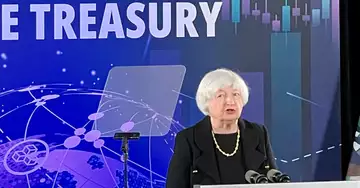Janet Yellen, speaking recently at American University, made erudite, common-sense remarks about the right approach to regulating digital currencies and assets, innovation, and the politics surrounding them.
The U.S. Treasury secretary pointed to the sector's explosive growth from $14 billion to $3 trillion in just five years and its origins. She even addressed the original Bitcoin white paper's solution to prevent the same digital assets from being spent twice - a major criticism of Bitcoin's predecessors.
Yellen said that "the role of government should be to ensure responsible innovation - innovation that works for all Americans, protects our national security interests and planet, and contributes to our economic competitiveness and growth. Such responsible innovation should reflect thoughtful public-private dialogue and take into account the many lessons we have learned throughout our financial history. This kind of pragmatism has served us well in the past, and I believe it is the right approach today."
Adelle Nazarian is the executive director of the American Blockchain PAC, which protects blockchain and digital asset innovation in the U.S. and opposes laws that restrict the growth of crypto assets.
In a recent interview with the Huffington Post about crypto legislation, I noted that we need new rules, new language, and a more elastic framework for Initial Coin Offerings (ICO) that is consistent with anti-money laundering (AML) and know-your-customer (KYC) rules and ensures that innovation can continue to flourish.
The American Blockchain PAC, which I lead as CEO, welcomed Secretary Yellen's sound guidance for developing a legal and regulatory structure to protect the public and create a climate conducive to innovation. Coincidentally, Rep. Glen "GT" Thompson (R-Pa.) has significantly advanced this process by proposing a thoughtful, well-articulated "crypto regulatory plan."
The "Thompson Principles" provide a framework for digital commodity exchanges, voluntary registration, and qualified digital commodity custodians. They also provide an enhanced process for creating digital commodities, full accounting of stablecoin assets and liabilities, protection of customers using stablecoins, and registration of users of asset-backed digital commodities. They would be consistent with and apply to digital goods already sold.
These proposals are consistent with the process prescribed by Secretary Yellen. Here is an example of the proposed voluntary registration:
"Trading venues would opt into the [Commodity Futures Trading Commission] Digital Commodity Exchange system or remain regulated by individual state money transmitter licenses. Trading venues will have an incentive to opt for CFTC regulation to reduce their regulatory burden as they face only one regulator, have the ability to offer leveraged trading, and are the entry point for new digital commodities for the retail audience.
According to the Congressional Research Service, 49 states require registration as money transmitters. It costs millions of dollars and years to work through the bureaucratic mazes, followed by persistently onerous compliance requirements, to make this a reality. The process is prohibitively expensive for most startups and stifles innovation without meaningfully increasing public protections. Giving companies the option of one-stop shopping is consistent with Secretary Yellen's pragmatic advice.
Congress and the financial services industry are finally realizing that cryptocurrencies are not just another extraordinary, popular illusion or the result of the madness of the masses. The blockchain (from which cryptocurrencies emerge) is the foundation for many important new technologies such as non-fungible tokens, Web 3, and the Metaverse.
And President Joe Biden's Executive Order to "Ensure the Responsible Development of Digital Assets" calls for risk mitigation while recognizing that "the United States has an interest in ensuring that it remains at the forefront of the responsible development and design of digital assets and the technology underlying new forms of payments and capital flows in the international financial system. ..."
The White House, Treasury Secretary and members of Congress, including Rep. Thompson and the chairs of the Congressional Blockchain Caucus - Reps. Bill Foster (D-Ill.), Darren Soto (D-Fla.), Peter Schweikert (R-Ariz.) and Tom Emmer (R-Minn.) - are representatives of the burgeoning distributed ledger sector, as is the American Blockchain PAC.
The key players in the public-private dialogue recommended by Secretary Yellen have already come together. It is time for all of these parties to come together in the Secretary's conference room.
Such a conversation would advance President Biden and Secretary Yellen's respect for public safety, keep America at the forefront of responsible development, and shape the future of digital assets and technologies.

